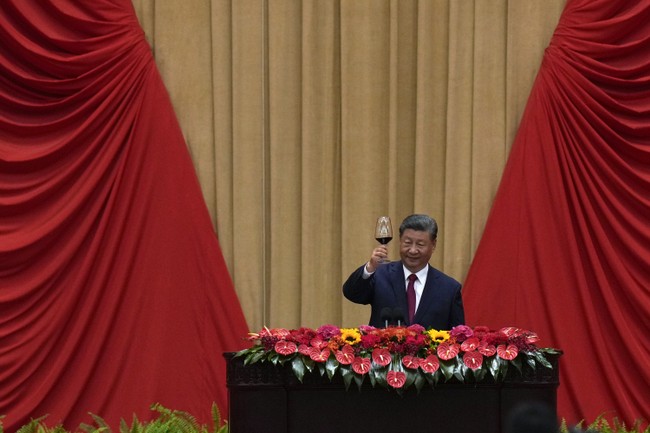
If we draw a circle around North America and South America, the United States has everything we need as a country and an economic powerhouse: capital, labor, energy, food, and natural border protection.
Advertisement
These are the essential makings of a strong economy and in order to capitalize on the fruits of our region, we must first support their growth.
But the headline-capturing rhetoric from pundits and politicos is frequently about warding off the unwelcome influence of powerful adversaries to support American prosperity, only to neglect that our best path towards this goal is by further embracing our geographical neighbors.
But President Trump gets it. America First runs alongside regional strength, not in absence of it.
Enhancing Domestic Opportunity
Prioritizing the opportunities of American citizens begins at the homefront but is enhanced through cooperation and partnership with our nearby allies. To that extent, it is clear that policy that places all of the Americas first puts the United States in the best position to deliver for the American people first and foremost.
Careful consideration for our neighbors is key to building a strong America, as cultivating longstanding regional relationships will serve the United States in both the short and long run.
As our foreign adversaries continue to retaliate, as seen in China’s recent countervailing export bans on rare earth metals in light of new U.S. bans on the export of semiconductors to the country, our regional relationships will only grow in importance. Preserving strong relationships throughout the Americas means we could turn to countries like Chile or Brazil, which has the third largest rare earth reserves in the world with an estimated 21 million tons of rare-earth oxide (REO), as Chinese aggression accelerates. It is vital we look to our North and South American neighbors in these situations to preserve necessary supply chains.
Advertisement
COVID exposed the peril that an unsecured global supply chain can inflict on American consumers (e.g., inflation, shortages) — and with an increasingly unstable geopolitical climate, ensuring stability across our economic partners in the Americas is of the utmost importance.
President Trump’s leadership has already brought about groundbreaking partnerships across the Americas, including the USMCA, which replaced NAFTA. President Trump understands better than anyone that strong neighbors make for a strong home.
Ensuring Long-Term Regional Stability
It was not long ago that my mother was one of eight children living in Havana, Cuba, at a time when the area could’ve been the poster child for regional instability. She eventually immigrated to the United States at the age of 18 — arriving in Miami and settling in New York.
She was able to escape the perils facing Cuba and raise a family in the United States and supporting pipelines to legal immigration in the States remains essential. Though, the opportunity we can offer Americans, both native and those who have legally immigrated here, only grows with stable neighbors.
According to the Office of the United States Trade Representative, the “U.S. goods exports to the Western Hemisphere in 2022 were $905.5 billion” — this is up 31 percent from 2012. It is abundantly clear that good neighbors are good for business and good for Americans.
Advertisement
It is now incumbent on us to do everything we can to preserve and strengthen our relationships with our regional allies.
Case Study: Brazil
Brazil is the largest economy in South America and one of the United States’ most important economic partners in the region — and it’s in our best interest to keep it that way.
Exports from the United States to Brazil hit $53.8 billion in 2022 — a double-digit increase over the previous year. With $38.9 billion in imports from Brazil, the United States also ran a trade surplus of roughly $14.9 billion. Brazil is a crucial economic stronghold for America, as it exhibits vibrant and growing demand for American exports.
In recent years, China has broken through as Brazil’s largest trading partner — with trade reaching $150 billion between the two nations in 2022. Even though Brazilian exports made up a large portion of this trade ($89.7 billion), it is concerning to see the People’s Republic of China extending its economic ties in the region.
Warding off influence from communist nations is of top importance — and one crucial step in this process is implementing hardline policies that will preserve our coveted relationships with valuable trading partners in the Americas.
A Modern-Day Monroe Doctrine
Advertisement
The original Monroe Doctrine was perhaps one of the grandest pieces of policy that dealt with the neighbors of the United States.
The geopolitical climate has undoubtedly changed since the original Doctrine — our neighbors are increasingly subject to the influence of the Chinese, Russians, Iranians, and other foreign proxies who are trying to peddle ideas and policies that run antithetical to American interests.
Examining China, we notice it has become the world’s processor of natural resources like iron ore and steel — affording the nation an undue influence over the supply of all finished materials and the opportunity to meddle in the Americas. But we can curb this. The Americans can be self-sufficient in our supply of such materials if we invest in Western Hemisphere infrastructure and expand American capabilities of finishing raw materials.
The United States does not seek to buy South America or project power the way China is doing with expensive infrastructure projects — America First is about reaffirming that the Western Hemisphere is off limits to foreign interference while bettering the lives of Americans through smart diplomacy with South American countries who would be thrilled to enhance economic ties with the United States.
Advertisement
President Trump has been highly successful in negotiating Western Hemisphere bilateral trade agreements that work for the American people (like the USMCA) and is now restoring the U.S. to an America First path that includes partnerships across the Americas, which will be vital for American consumer and corporate prosperity.
We need to embrace our neighbors in North and South America, if not for their sake, then for ours.

